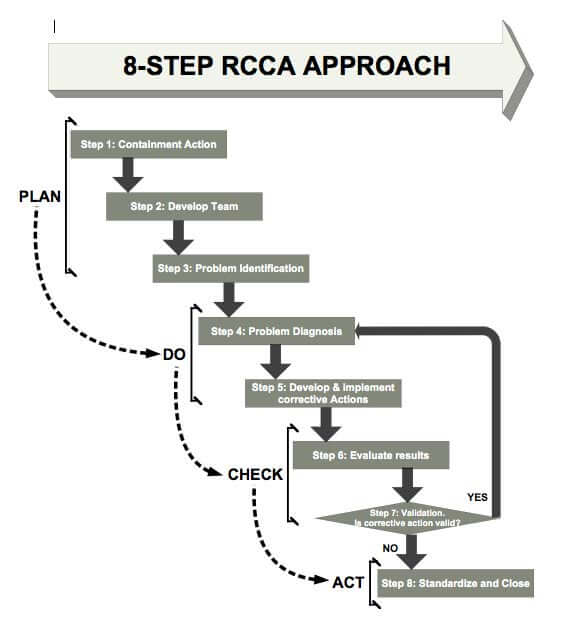Manex uses a structured, proven approach to help address both the sporadic spikes and chronic issues leading to inefficiencies and operating cost increases.
RCCA eliminates and minimizes non-conformance, which leads to immediate cost-savings and quality improvements, and in most cases, quality and non-conformance issues can be corrected in 5 days or less. In addition, RCCA yields significant, sustained results by enabling employees to understand the foundational approach in identifying, formulating, analyzing and resolving problems.
Approach
The 8-steps involved in the RCCA process are as follows:
- Containment Action: Assess the damage and take immediate actions to stop the problem at the source.
- Develop Team: Identify the stakeholders that directly or indirectly participate or are affected by the process. Define the team structure and obtain buy-in.
- Problem Identification: Identify the problem, define it and identify the scope of the problem.
- Problem Diagnosis: Brainstorm for potential root causes and narrow down to the root cause with the help of various problem solving tools.
- Corrective Action: Determine and implement the corrective actions. Establish critical control points and monitor the progress.
- Analysis: Analyze the data/results of implementation to assess the effectiveness of the corrective action.
- Validation: Take appropriate action based on results from evaluation. This action is based on the effectiveness of the corrective action implemented.
- Standardize and Close: Complete the process by documenting lessons learned. Standardize the controls for similar problems in future.

Once the RCCA process is successfully complete, the results are used to develop a proactive approach to prevent the occurrence of problems.
Moreover, RCCA enables identification of “poka-yoke”/ mistake-proofing controls, which are installed on the critical control points identified in the process stream. During the course of the RCCA process, we employ an “RCCA A3 Report”, which is used to document each step of the RCCA process. This is a one-page document, the size of A3 paper. The RCCA A3 Report captures the entire RCCA process and serves as a reference document for future actions, providing high-level overview of the problem encountered, tools used, countermeasures identified, savings projected, project plan and lessons learned. Additional controls are later established – in the form of metrics and a taskforce – to hold the gains and sustain the change.
Benefits
- Eliminates decision making based on preconceived notions
- Identifies all possible causes and address the TRUE root cause and not the symptom of the problem
- Addresses immediate needs by identifying correction and enabling corrective action
- Allows for precise prediction of potential result when thae causes are corrected
- Helps in proactive planning to develop preventive measures
- Eliminates the recurrence of the problem
- Provides a structured/standard approach to address non-conformance
- Results into operating improvements by directly impacting the Cost of Goods Sold
- Reduces or eliminates internal and external rework and warranty issues
- Enhances customer satisfaction


